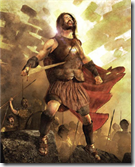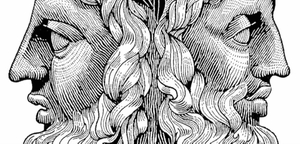
From Freedom to Fulfillment
I’ve always been fascinated by how the NT writers interpreted and applied God’s activity under the Old Covenant to the church. The Exodus narrative, of course, was hugely important to the faithful Israelite. In the eyes of a worshipper of Yahweh, the Exodus was the greatest display of God’s power since creation.
The prophets often encouraged Israel by recounting how God ‘bared his holy arm before the nations’ and took a people for himself from Egypt by great signs and wonders. It was the founding event for Israel as a nation.
One could argue that the Exodus narrative played the same role for OT Israel as the Cross and Resurrection play for the church – it was the anchor for their identity. This correspondence is something the NT writers explicitly teach in various contexts (1 Cor 10; Heb 3-5).
The Exodus narrative has two parts to it: “coming out” of Egypt under Moses and “going in” to the promised land, under Joshua. Moses brought Israel into freedom and Joshua brought them into fulfillment.
Moses and Joshua As Types Of Christ

I’d like to suggest that these two events illustrate two different aspects of grace that come to us through Jesus’s leadership. That is, grace operates through faith to bring us both into freedom and fulfillment, but in slightly different ways. Moses and Joshua together typify Christ who brings us from slavery into freedom and fulfillment.
Grace for Freedom: Receiving by Faith
Moses was sent by God in response to Israel’s desperate cries and prayers under the oppression of Pharaoh (Ex 2:23). Israel was suffering, afflicted, in bondage to an oppressive master and in response, God in his mercy sends Moses as a deliverer.
To come into freedom, Israel had to simply believe in Moses and follow him. With God’s guidance and Aaron’s help, Moses did it all. He approached Pharaoh, confronted him, challenged his power and demonstrated the utter superiority of Yahweh over the gods of Egypt. Very little was expected from Israel except faith in Moses and a willingness to follow him. To get free all they had to do was to be ready to leave and smear a little blood on their doorpost.
On the night of the Passover, the power of God fell in Egypt and the gates of their prison opened, and they simply walked out. They came out with gold and silver from their Egyptian neighbors who suddenly were in awe of them. When Pharaoh relented and brought his army to reclaim his slave nation, God destroyed him – the same sea that “baptized” Israel into Moses destroyed the enemy’s power completely.
In fact, the climactic summary of Moses’ leadership is seen in his admonition:
“Fear not, stand firm, and see the salvation of the Lord, which he will work for you today….The Lord will fight for you, and you have only to be silent.” (Ex 14:13-14).
Freedom from slavery, bondage and oppression came by grace, through faith by simply receiving.
This is illustrative of the way we receive salvation and freedom from slavery to sin and Satan in Christ. We believe in Jesus and are willing to follow him – everything else he does for us. We believe and receive, with no effort, a perfect righteousness. Getting free from sin similarly pivots on what Christ has already done for us, not on our efforts (Rom 6:5-11). We receive freedom by grace through faith, passively… we do not “break ourselves free” but start with believing that we have been set free. Jesus is our Moses who has done it all for us – we simply receive.
Grace for Fulfillment: Possessing through Faith
Joshua’s role marks a whole new way of living for Israel. They did fight wars during their wanderings in the desert, but mostly in a defensive sense.
His leadership role is laid out clearly:
“Be strong and courageous, for you shall cause this people to inherit the land that I swore to their fathers to give them” (Josh 1:6).
He must rally God’s people to fight for what they received through promise.
The land was given to them by promise, yet needed to be possessed. This involved a kind of faith that co-operates with God. The God’s power and grace would be released as they believed the promise and stepped out in obedience to claim it. Jesus, then, is also our Joshua who calls us into fulfillment.
Just to be very clear, it was still God fighting for them (grace), just in a different sense that required their active participation:
For the Lord has driven out before you great and strong nations. And as for you, no man has been able to stand before you to this day. One man of you puts to flight a thousand, since it is the Lord your God who fights for you, just as he promised you.(Jos 23:9-10)
Israel was given cities and towns with pre-built homes and cultivated vineyards. They were meant to enjoy the land and worship Yahweh. All their enemies would be driven before them, but not until they went forward and faced them. As much land as they claimed by faith and possessed would be theirs, and any enemy they fought against would be driven out. But it was up to them, in that sense, to fight and take, though ‘all the land’ was given to them as an inheritance.
Caleb (Josh 14:6-13) exemplifies this faith as he seeks to take ‘the hill country’ even as everyone else in Israel decided they were done.
What does this mean for us today? There are riches of grace given to us in Christ already, but there is more to possess. There is land to claim, fight for and cultivate by grace through faith. It is given by promise, but it needs to be actively pursued. There are gifts and graces of power and wisdom and love that come to us as we say “This is promised to me in Christ and I will seek until I receive it”.
The Tragedy: Freedom without Inheritance
But Paul also uses the Exodus narrative to highlight the tragedy of getting free, but never inheriting God’s promises. A whole generation of Israel came out of Egypt, but never came into the Promised Land. They died because they were enslaved in their hearts to fear and evil desires and they were mastered by unbelief (1 Cor 10:1-11).
They experienced the supernatural ministry of Moses, but refused to follow Joshua (when he came back from spying out the land) and so they died. Note that God did not strike them dead, but let them live out their lives wandering the desert. They were free, but never fulfilled. They experienced deliverance but never entered their destiny.
Another kind of tragedy is people under Joshua who took some of the land and defeated some of their enemies. At some point decided they were done fighting. They wanted to settle down and enjoy the land they already had. What did it matter if a few enemies were still around? They had “rest” (Josh 11:23), so they were content. They ignored the call to take ‘all the land’ and drive out ‘all their enemies’ so ‘all of Israel’, including succeeding generations, could enjoy the fullness of God’s inheritance. They settled for less than what was promised.
So where are you today? In the words of Joshua:
“How long will you put off going in to take possession of the land, which the Lord, the God of your fathers, has given you?” (Josh 18:3).
You have been freed so you can enter into the full inheritance that Jesus has for you. It is yours, take it, by grace through faith!


